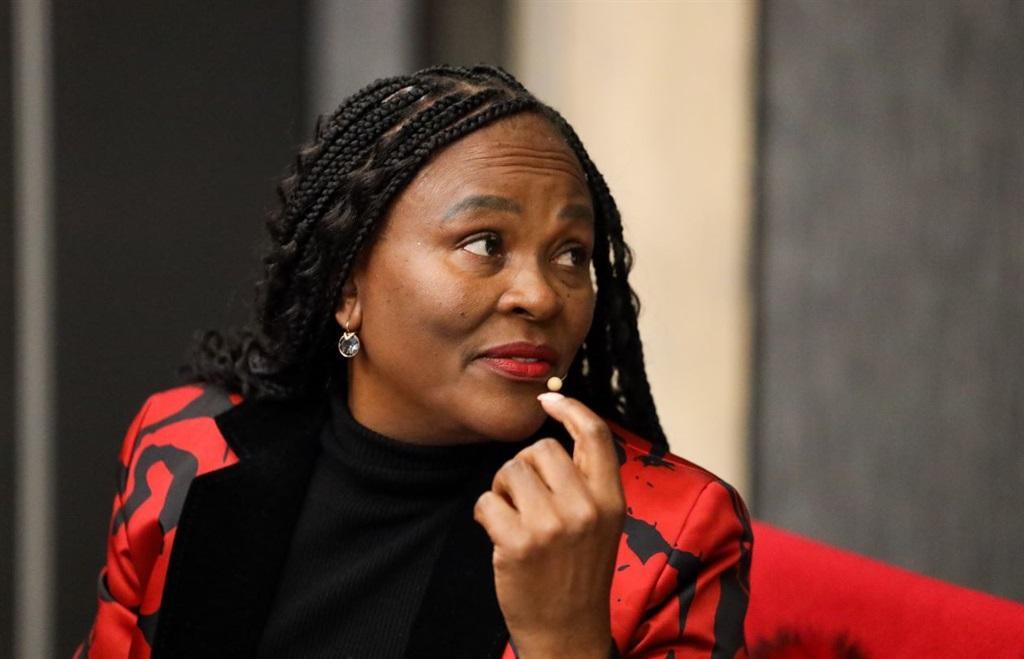Africa-Press – South-Africa. While the DA and the Organisation Undoing Tax Abuse (OUTA) are baying for the speedy removal of Public Protector Busisiwe Mkhwebane – before she can receive a gratuity of around R10 million – the EFF, ATM and UDM disparaged the parliamentary process that culminated in a report to the National Assembly recommending her removal.
The Section 194 committee on Tuesday adopted its report on the inquiry into Mkhwebane’s fitness for office. It found her guilty of misconduct and incompetence, and recommended her removal.
Mkhwebane’s term of office expires on 14 October. If she is still in office at this time, she would be entitled to a gratuity of around R10 million. During the impeachment process, whose hearings started on 11 July last year, Mkhwebane waged a war of attrition with the committee.
It included protracted legislation, before and during the inquiry, which necessitated postponements, unsuccessful applications for the recusal of committee chairperson Qubudile Dyantyi, the DA’s Kevin Mileham and the evidence leaders, filibustering by Mkhwebane’s lead counsel, advocate Dali Mpofu, calling irrelevant witnesses and another application for Dyantyi’s recusal.
This meant the process, which was initially scheduled to be completed by September last year, with R4.5 million as Mkhwebane’s legal costs, is still ongoing, and her legal costs have ballooned to R30 million.
DA deputy chief whip Annelie Lotriet, who served on the Section 194 committee, said in a statement that it was “scandalous” that Mkhwebane from the start of the process “employed various delaying tactics” to avoid her removal before her term ended.
“Her aim is to secure a ‘gratuity’ of about R10 million she will receive when she completes her term by ensuring she is not impeached before then,” said Lotriet.
“It would be a public outrage if someone who significantly harmed the Office of the Public Protector could escape unscathed and receive a substantial final payment at taxpayers’ expense through deliberately avoiding accountability.”
She said the DA was determined to ensure that Mkhwebane was removed “to prevent this last abuse of her office by Mkhwebane for personal gain”.
Lotriet said:
The National Assembly Programming Committee must schedule the report, once tabled in the National Assembly, to be considered by the House. A two-thirds majority vote is required for Mkhwebane’s removal. Given that the ANC, DA, IFP, FF Plus and ACDP supported the report and its recommendation for Mkhwebane’s removal, it seems probable that a two-thirds majority would be achieved, unless several MPs from these parties vote against the whip.
Lotriet said the DA applauded the Section 194 committee for adopting the final report.
“The prolonged and convoluted process was largely influenced by Mkhwebane’s Stalingrad approach, prolonging the hearings,” she said.
“The DA recognises that the committee bent over backwards to accommodate Mkhwebane’s numerous requests that caused such delays in the process.”
The EFF, ATM and UDM, who from the start of the process backed Mkhwebane, were less enthused by the report.
In a joint statement, the three parties claimed the committee’s report “unjustly” recommended Mkhwebane’s removal.
“Throughout the inquiry, we consistently asserted that both the administrative and procedural aspects of the process were deficient. We recognise and understand Parliament’s resource constraints. However, we cautioned against moving hastily through the process, as this only serves to compromise the results.”
The parties claimed there were several “non-credible witnesses” without providing examples or substantiation. Echoing Mkhwebane’s line, they claimed Dyantyi was biased and that the process had a predetermined outcome.
“It’s distressing that advocate Mkhwebane was pressured into participating in the enquiry without adequate legal representation,” the three parties said.
In fact, the committee never prevented Mkhwebane from having legal representation, as required by a Constitutional Court ruling, while Mkhwebane appeared to frustrate the process of appointing her attorneys and at one stage instructed her attorneys to only brief counsel for another application for Dyantyi’s recusal.
“We have unequivocally stated our objection to the final report, primarily due to the perceived unfairness, irrationality, and procedural oversights exhibited by the committee. Furthermore, [we] reserve our right to subject this report to a legal review.”
On Wednesday, Dyantyi said he was confident that the committee’s report would withstand judicial scrutiny.
“We’re very confident that any other court would find in our favour, because we stayed on rationality, we stayed on fairness,” he said.
“The fact that this process has been so long, is the result of the kind of patience that we exercised on behalf of Parliament, to go beyond the six months that we initially planned. So, we have no doubt, we are very confident, even the planned, or threatened review, of this report, we welcome that.”
He said those heading to court were acting within their rights.
“We know, from the very word go, the Public Protector would have referred to this as an illegal, unlawful, irrational, invalid process.
“Many of those issues have been tested in court already and found in our favour. And so not to come here and boast about that, but to say that when you stay the course in terms of your work, I think it is worth it in the end.”
Meanwhile, OUTA expressed a sentiment similar to the DA.
Advocate Stefanie Fick, OUTA’s executive head of accountability, described the adoption of the final report as a “resounding victory for accountability”.
However, OUTA was critical of the protracted process and called on the National Assembly to prioritise the interests of the citizens and take swift action to remove Mkhwebane from office.
“Even though she is nearing the end of her term, she cannot be allowed to stay in the position any longer. The country stands at a critical political crossroads, and the credibility of an essential Chapter 9 institution hangs in the balance. We need a firm and swift decision to bring an end to this matter,” said Fick.
For More News And Analysis About South-Africa Follow Africa-Press






